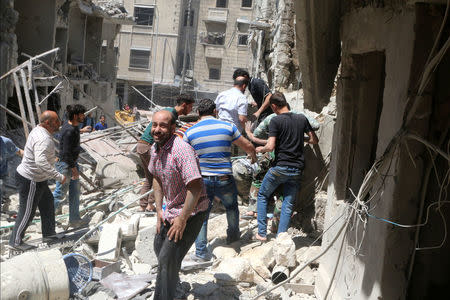U.S. says Syrian government solely behind Aleppo hospital strike

WASHINGTON (Reuters) - Indications are that Syria's government was solely responsible for an air strike on a hospital in Aleppo, the U.S. State Department said on Thursday, urging Russia to use its influence to pressure Syrian President Bashar al-Assad to stop the attacks. State Department spokesman John Kirby said Washington was still learning more about the attack on Wednesday night that killed children and doctors at the hospital supported by Doctors Without Borders. "The indications that we have now are that these strikes were conducted solely by the regime," Kirby said. He denied statements by the Russian Defense Ministry that a plane belonging to the U.S.-led coalition was seen over Aleppo on Wednesday evening. Russia's backing for Syrian government forces has helped swing the war in favour of Assad, although Russia previously denied hitting civilian targets in Syria where it launched air raids late last year to bolster its ally. Asked whether the strikes on the hospital were conducted with the backing of Russian forces, Kirby added: "Not from any measure that we can tell at this point." But he said Moscow still wielded influence over Assad. "We're not at the point where we'd say they don't have influence over Assad," Kirby said, adding: "What's curious and what we'd like to know more is to what degree are they actually assertively, aggressively using that influence right now because on the face of it ... it would appear that influence isn't being asserted as energetically as we believe it could be." The city of Aleppo has been at the epicentre of a military escalation undermining peace talks in Geneva to end the five-year-old war. U.N. envoy Staffan de Mistura appealed to the presidents of the United States and Russia to intervene. Kirby said the Syrian cessation of hostilities was "very much in peril" because of the violations and urged Moscow to use its influence over Assad to halt the attacks. (Reporting by Lesley Wroughton and Arshad Mohammed; Writing by David Alexander; Editing by Susan Heavey and Peter Cooney)

